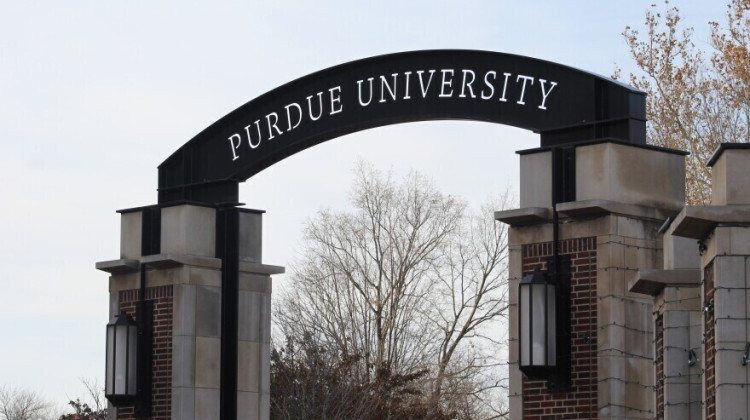
From left, Indiana Supreme Court Justice Mark Massa, Chief Justice Loretta Rush and Justice Derek Molter listen to student questions at a traveling oral argument at the University of Indianapolis on Apr. 11, 2023.
Brandon Smith/IPB NewsA 2021 state law that banned class-action lawsuits against colleges and universities related to COVID-19 could be struck down by the Indiana Supreme Court.
The court heard a case Tuesday that stems from a student’s class-action against Ball State University, seeking a partial refund after in-person classes were canceled during the pandemic.
After the student’s lawsuit was filed, the legislature passed a law, HEA 1002-2021, banning class-action suits against higher education institutions related to COVID-19.
The trial court considering the student's case directed him to refile as an individual. The student then appealed, challenging the new law.
The argument boils down to this: is the 2021 statute banning class-action lawsuits predominantly substantive – that is, having to do with public policy – or is it predominantly procedural?
Attorney Colin Flora, representing the student, said the law fundamentally deals with court procedures – which is not the power of the legislature.
“The statute now is trying to say, ‘You students, who otherwise under contract law would be entitled to these refunds, we’re not going to give you a viable mechanism to recover your money," Flora said.
The Indiana Court of Appeals sided with the student, ruling the ban improperly interfered with court procedures.
READ MORE: Additional COVID-19 liability protections for health care providers head to governor
Join the conversation and sign up for the Indiana Two-Way. Text "Indiana" to 73224. Your comments and questions in response to our weekly text help us find the answers you need on statewide issues.
But attorney Brian Paul, representing Ball State, said the legislature was making a policy statement to provide schools with relief as they faced unprecedented challenges.
“The schools should not have to defend those claims while also facing the costs and pressures to settle that class-action litigation brings,” Paul said.
There is no timetable for the Indiana Supreme Court’s ruling.
The original issue in the case asks whether Ball State should reimburse students for on-campus essentials – like technology, health services, activities and transportation.
Justices asked Flora why the case needed to be a class action when the student could sue individually.
“The defense of Ball State is vigorous," Flora said. "If the amount at issue is at most a few thousand dollars, the court and the legislature have had to create small claims courts to even allow such cases to go forward at all, because it’s not viable for counsel to be retained, not viable for most litigants to put it forward.”
Paul, representing Ball State, said the university was trying to be nimble in an uncertain time.
“These schools had to do something in an instant they had never done before. That is to go completely online. They soldiered on, they provided the education that these students had paid for, and still they are being sued,” Paul said.
Indiana Public Radio's Stephanie Wiechmann contributed to this story.
Brandon is our Statehouse bureau chief. Contact him at bsmith@ipbs.org or follow him on Twitter at @brandonjsmith5.
9(MDAyMzk1MzA4MDE2MjY3OTY1MjM5ZDJjYQ000))
 DONATE
DONATE






 Support WFYI. We can't do it without you.
Support WFYI. We can't do it without you.